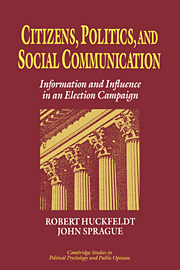Book contents
- Frontmatter
- Contents
- Acknowledgments
- I Democratic politics and social communication
- II Electoral dynamics and social communication
- III Networks, political discussants, and social communication
- 6 Political discussion in an election campaign
- 7 Networks in context: The social flow of political information
- 8 Choice, social structure, and the informational coercion of minorities
- 9 Discussant effects on vote choice: Intimacy, structure, and interdependence
- 10 Gender effects on political discussion: The political networks of men and women
- IV The organizational locus of social communication
- Bibliography
- Index
8 - Choice, social structure, and the informational coercion of minorities
Published online by Cambridge University Press: 22 March 2010
- Frontmatter
- Contents
- Acknowledgments
- I Democratic politics and social communication
- II Electoral dynamics and social communication
- III Networks, political discussants, and social communication
- 6 Political discussion in an election campaign
- 7 Networks in context: The social flow of political information
- 8 Choice, social structure, and the informational coercion of minorities
- 9 Discussant effects on vote choice: Intimacy, structure, and interdependence
- 10 Gender effects on political discussion: The political networks of men and women
- IV The organizational locus of social communication
- Bibliography
- Index
Summary
To what extent do people impose their own political preferences on the search for political information? To what extent is such an effort limited by the availability of alternative information sources? This chapter develops a model of discussant choice that incorporates individual political preferences as they operate within the boundaries and constraints of the social context. Special attention is given to the consequences attendant on minority and majority preference distributions in the local social milieu. We argue that rational voters exhibit rational information search behavior, but the outcome of rational search is a compromise between individual political preference and socially structured discussion opportunities.
Citizens in a democracy exercise free choice when they obtain political information. They avoid some information sources and they seek out others based on their own political preferences and viewpoints. Indeed, the availability of informational alternatives is one of the defining characteristics of democratic politics. Liberals are free to read liberal newspapers and conservatives are free to read conservative newspapers. More important for this analysis, Democrats are free to seek out other Democrats as political discussion partners, and Republicans are free to seek out other Republicans. While this sort of free informational choice is central to democracy, it is also constrained by social structure. Free choice operates within opportunities and constraints that are imposed by the social context, and the central issues pursued here are two.
- Type
- Chapter
- Information
- Citizens, Politics and Social CommunicationInformation and Influence in an Election Campaign, pp. 146 - 158Publisher: Cambridge University PressPrint publication year: 1995

